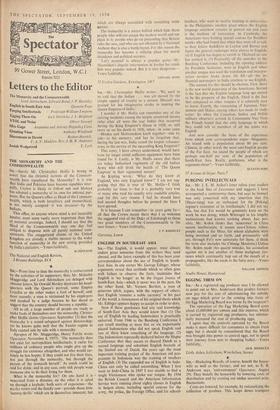ENGLISH IN SOUTH-EAST ASIA
SIR,—The English, it would appear, must always endure great nonsense from the writers they send abroad, and the latest example of this has been your correspondence about the use of English in South- East Asia. In one corner Mr. George Edinger, whose arguments reveal that certitude which so often goes with failure to observe the facts, maintains that English is 'no longer' to be the lingua franca of South-East Asia—which it never was in the past. On the other hand, Mr. Vernon Bartlett, a man of generous spirit, argues, with the support of others, that English 'remains a noble currency' in his part of the world, a restatement of his original thesis which Mr. Edinger appears happy to accept in order to deny.
Now if these gentlemen had any real knowledge of South-East Asia they would know that (1) The use of English by leading Indonesians is practically universal. From 1946 to the Bandung Conference I can recall meeting at most five or six importantly placed Indonesians who did not speak English and two of these knew something of the language. (2) The Indonesians repeatedly declared before the Hague Conference that they meant to discard Dutch as a second language and substitute English because of the limited use of Dutch. Six years ago the most important training project of the American aid pro- gramme in Indonesia was the training of teachers of English. (3) The expanded use of English in Indo- China can only be called astonishing. When 1 first went to Indo-China in 1947 I was unable to find a single Vietnamese who spoke our tongue. By 1954 the British Council and the American Information Service were running about eighty classes in English in Saigon alone, including special courses for the army, the police, the Foreign Office, and for school-
teachers, who were to receive training at universities in the Philippines, another place where the English language somehow remains in general use and even is the medium of instruction. In Cambodia the Americans were holding special courses for Buddhist monks who had found that when they went off to talk to their fellow Buddhists in Ceylon and Burma and Japan the general exchanges were always in English. (4) If English has begun to vanish in Thailand no one has noticed it. (5) Practically all the speeches at the Bandung Conference, including the opening address by President Soekarno, were in English and when another tongue was used the translation and interpre- tation services broke down. (6) All—all—the in- fluential newspapers in India continue to use English. The reasons for this should be obvious. First, there • is the new world panorama of the Americans. Second is the tact that the English language long ago ceased to be the property of the English. Third is the fact that compared to other tongues it is relatively easy to learn. Fourth, the romanising of Japanese, Viet- namese and Malay, among others has made its study easier. So when the Canadian, Indian and Polish military observers arrived in Communist Viet Nam the French found that the only latiguage in which they could talk to members of all the teams was English.
And now consider the basis of the experience from which your correspondents argue—Singapore. An island with a population about 80 per cent. Chinese, in other words the most anti-English people of the Far East. An island the people of which are perhaps one-half per cent. of the population of South-East Asia. Really, gentlemen, what is the argument about ?—Yours faithfully,
QUENTIN POPE
57 Avenue de Segur, Paris 7


































 Previous page
Previous page